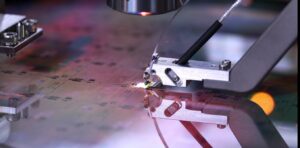The case for continuing to write by hand

Ivan Kruk/Shutterstock
At the beginning of 1882, the philosopher Friedrich Nietzsche received a machine called the “Malling-Hansen Writing Ball”, a nifty little gadget covered with keys. The thinker’s eyesight had been getting worse, to the point where he could no longer write by hand. In March of the same year he was able to continue writing thanks to this new instrument.
His friend, the composer Heinrich Köselitz, noted a certain stylistic change in his texts from that time onwards, as his prose became more terse and succinct. It appears that the content of some of his philosophy was also affected.

Malling-Hansen writing ball, as used by F. Nietzsche following his loss of eyesight.
Wikicommons Media /Tekniska museet, Estocolmo, Suecia., CC BY-SA
Embodied cognition
This change –a reminder that “the medium is the message”– might be explained by new theories of embodied cognition. Modern cognitive science indicates that motor and sensory aspects of our behaviour have consequences that reach further than we may, at first, suspect.
Our minds are not filled with disembodied ideas. We need to take our bodies and senses into account in order to explain phenomena that are otherwise inexplicable.
In a study carried out almost two decades ago, subjects were presented with words carrying a positive connotation (such as “sweet”) or negative (such as “rubbish”). Subjects had to indicate whether a word was “good” or “bad” by moving a joystick. Half of the subjects were told to indicate that a word was “good” by pulling the joystick towards their bodies, and the other half were told to indicate “good” by pushing it away.
To indicate that a word was “bad”, the subjects made the opposite movement to “good”. A consistent correlation was observed between meaning and movement: the quickest responses were produced by the subjects who were told to indicate “good” by pulling the joystick towards themselves, and to indicate “bad” by pushing it away.
This direct involvement of the body and senses in mental processes can explain how writing by hand (as opposed to other types of writing) helps us to learn letters and words. This is backed up by the results of various studies, which we will now present.
Memory ability
As an example, a 2021 study compared short and mid term recall of words learned either by typing or writing by hand. Recall was better when words had been learned with a pencil and paper.
In another study, a small group of adults learned new symbols (from a language of Asian origin) that they then had to reproduce with a pencil or a keyboard. When they had finished learning the symbols, there were no differences in recall between the two methods, but the keyboard users forgot a significant amount of what they had learned as time passed by.
Some experts suggest that learning by pen and paper is better because it is more “embodied”. This means that it involves a set of more complex sensory-motor processes particular to each letter. This complexity leaves a more distinctive footprint in our memories and, as a result, makes things easier to memorise and recall, much like how a two metre tall supermodel might be more memorable than someone with average features.
Mental resources
Another benefit to writing by hand is that is puts less strain on our brains. Typing puts more demand on our mental resources, causing difficulties when it comes to word memorisation tasks. The increased mental load is due to the greater speed at which words are typed. This, in turn, means there are more individual elements to process over a certain period of time.
The idea of complexity appears in other studies to explain similar differences when writing in a second language. Other authors have also suggested that more mental resources are used because writing is more complex when performed on the keyboard.
Planning and composition
The way we write can also affect higher levels of word processing in our brains. It is thought that the type of writing sets the pace of cognitive processing – if the writing process is slow and cumbersome it can interfere with the higher processes on which it depends, causing ideas and relevant information to be forgotten.
In several experiments, an improvement has been noted in overall written composition (quality, length and fluidity of text) after subjects completed handwriting exercises. In the same vein, a study has shown that students plan their texts more carefully when using pen and paper than they do when using a keyboard.
Longer and better quality texts
Nevertheless, it must be recognised that keyboards have also brought us many advantages. For example, some meta analyses comparing hand written texts with those written on a computer found the latter to often be longer and better composed.
In addition, people with literacy problems are those who feel these benefits most acutely. However, some of these studies lack experimental rigour, which raises doubts about their clarity and general usefulness.
A disembodied mind
The Matrix film tetralogy presents the idea of a mind without a body. But a disembodied mind that exists only in the virtual world is much like Plato’s cave. The torches that cast shadows on the wall are replaced by computer simulations. In real life, however, the mind performs its operations alongside the functioning of our entire body.
We are closer to a purely symbolic, disembodied mind when we type on the keyboard (a device that works with minimal sensory involvement) than when we put pen to paper, as our cognitive system reacts differently depending on the motor and sensory inputs that we experience.
Implications for education
The results of these studies all indicate that eliminating handwriting from school – as has reportedly been done in Finland– is not a good idea.
Obviously, this does not mean that we should stop using keyboards, not even in infancy. However, we must be on the lookout for future studies on this topic, and act on their repercussions in the education sector as promptly as possible.
![]()
Javier Marín Serrano receives funding from the Spanish Ministry of Science and Innovation.
Miguel Ángel Pérez-Sánchez receives funding from the Spanish Ministry of Science and Innovation.
Olena Vasylets does not work for, consult, own shares in or receive funding from any company or organization that would benefit from this article, and has disclosed no relevant affiliations beyond their academic appointment.






